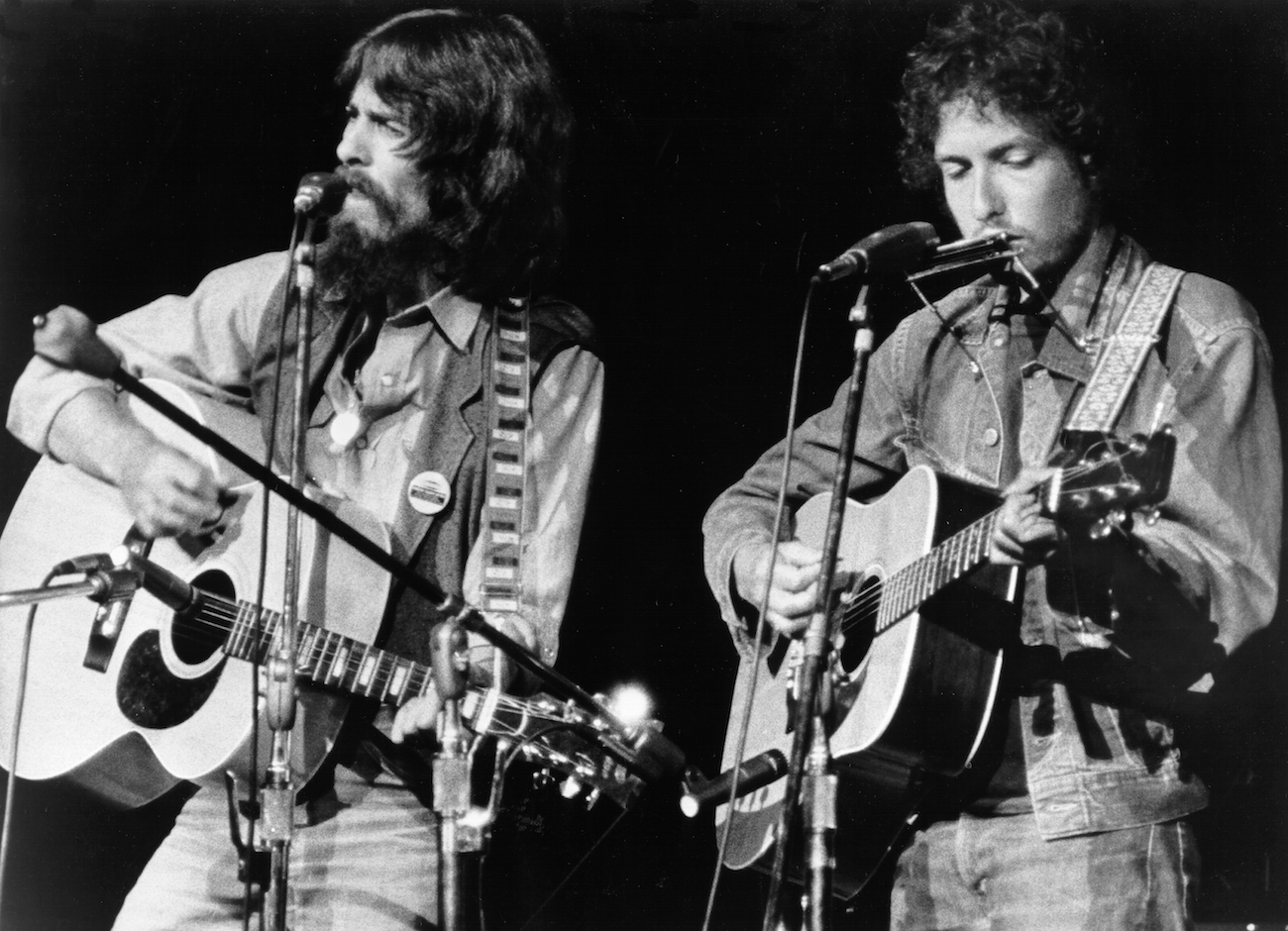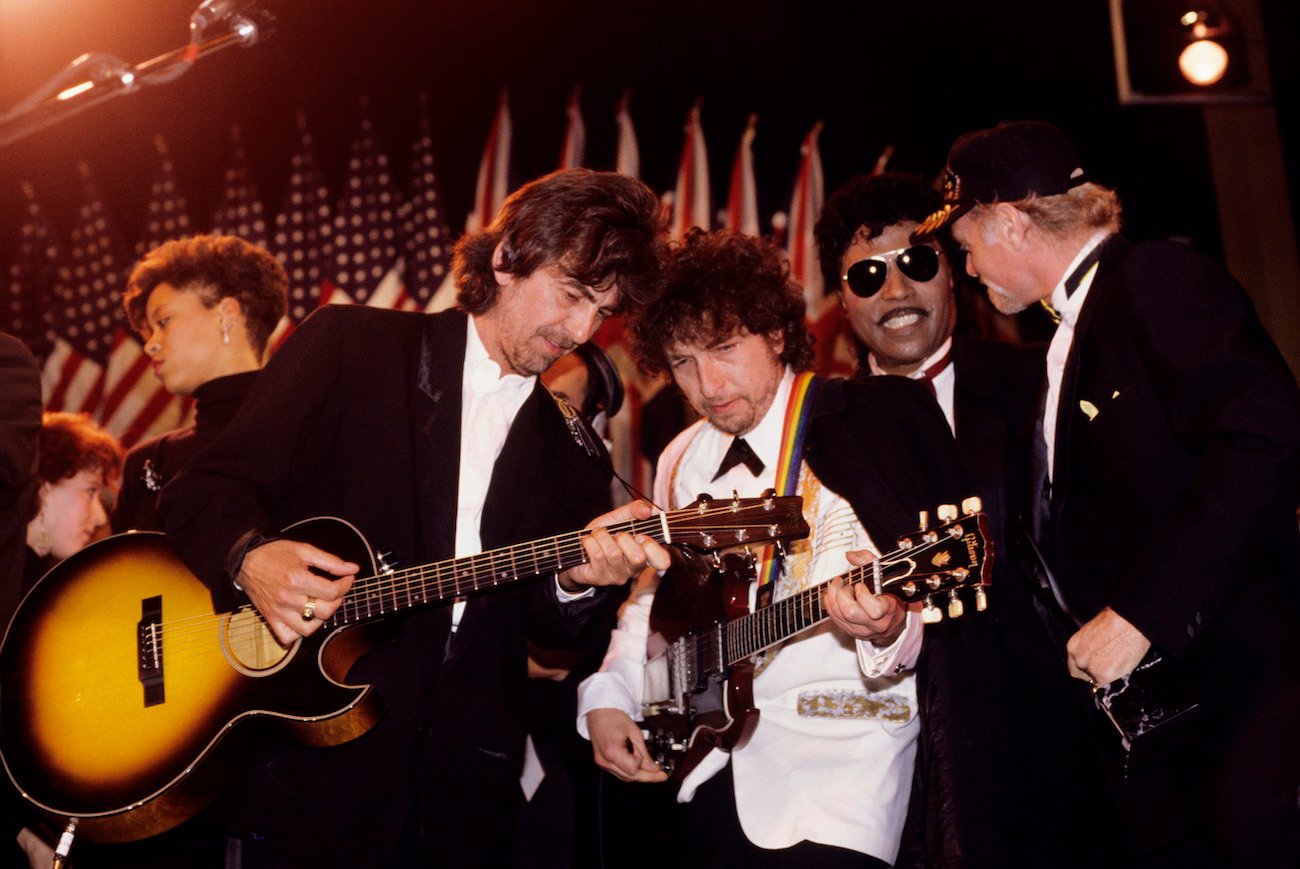
George Harrison Said the Rock Press Tried to ‘Kill’ Bob Dylan
George Harrison claimed the rock press tried to “kill” Bob Dylan. The former Beatle knew what it felt like to have the press eat you alive. However, he defended his friend as much as he could.

The Beatle defended Dylan after he began playing electric guitar
From the start, Dylan amazed George with everything he did. Whether Dylan sang folk, rock, or country, George loved it all. Other fans weren’t as open-minded.
George attended Dylan’s performance at London’s Royal Albert Hall in May 1965. Dylan walked on stage with an electric guitar.
In Here Comes The Sun: The Spiritual And Musical Journey Of George Harrison, Joshua M. Greene wrote that the move prompted boos from fans “who viewed the switch from acoustic as a betrayal of his folk purity.”
He continued, “George called those who walked out of the concert ‘idiots’ and argued ‘it was all still pure Dylan, and he has to find out his own directions. If he felt he wanted electrification, that’s the way he has to do it. Who’s laying down the rules?’
“Dylan had started his career with folk songs and protest music but by 1966 had moved away from pointing fingers at others and begun examining himself,” Greene continued. George was entering a period of self-examination then too, which was another reason he defended his friend and idol.
George would’ve fought in Dylan’s corner until he was bruised and battered, even if it meant going up against the rock press.
George Harrison claimed the rock press tried to ‘kill’ Bob Dylan
During a 1975 interview on WNEW-FM (per George Harrison on George Harrison: Interviews And Encounters), George explained that a shift happened once the 1970s began. Suddenly, no one cared about peace and love. A lot of hate started appearing, especially in the rock press.
“This is what kills me now, is when I see these people who supposedly, a few years ago, loved me and I’m supposed to love them,” George said. “And I see them, they’re just dropping apart at the seams with hate. I’m talking about Rolling Stone, actually, talking about Jann Wenner.”
George felt he had to watch out for his friends and fellow artists just as much as himself.
“But this is the thing though, God, we all came through so much in the ’60s, and we all wanted so much to create something positive, something good. It’s hard to … when we come out into the ’70s, we find it’s hard to go on. A lot of these people were only part-time hippies or part-time lovers.
“The badness of the world, or in them, caught up on them too soon, and you find that they’ll just turn around and they all start stabbing each other in the back. It’s like, we all need to support each other in many ways in order to exist.”
George said the rock press got gratification from dissecting musicians viciously. He knew from his days with The Beatles.
“I think it’s frustration, is a reason why … I don’t know, maybe a lot has to do with the stars, the planets, I mean like those stars. Because sometimes I’ve seen that type of thing happen in the past—well, it happened to me before, as a part of the Beatles.
“We went through a thing of going up and up and up, and part of the up is by people, that people contribute to your success by writing things about you. By getting behind you, you know? And a lot of the time, because they want to just go out and do that on their own… like, initially, you try and promote yourself and the record company and the press agents and that sort of thing.
“But say in the Beatles’ case, once it starts rolling along, people just get behind it and write good things and then it gets up to a point where so much has been said, and then they decide to take it from a different point of view and decide to … write about your faults.”
George saw what they did to Dylan too.
“They tried to kill Bob a few times,” he explained. “Also, the whole thing that split the Cream actually. You know, the band the Cream? It was something they said in Rolling Stone just sort of depressed Eric, I know, to such a point where he just thought … ‘just get out of this.'”
George said he couldn’t let what the rock press said affect him
An artist either had to agree with the rock press and “commit suicide” or take them with a pinch of “hate, salt.”
“You know, really, just—because I could read criticisms of myself and if I’m in a decent mood, I’ll think, ‘Well that’s unfair that is … maybe that’s fair,'” George said. “But if you get depressed you start agreeing with them. If you start agreeing with them, then you just go do yourself in. But I wouldn’t do that because enough things happen to prove that it’s not exactly how they see it.”
George said the rock press sometimes wanted negative reviews even if there weren’t any. When a publication did that to him, George didn’t care what they said anymore. “It made me feel, ‘Oh, forget it. They’re just trying to nail me now,’ and that’s it, that’s all it is.”
George nor Dylan cared much about what the rock press wrote about them.


